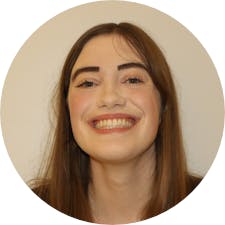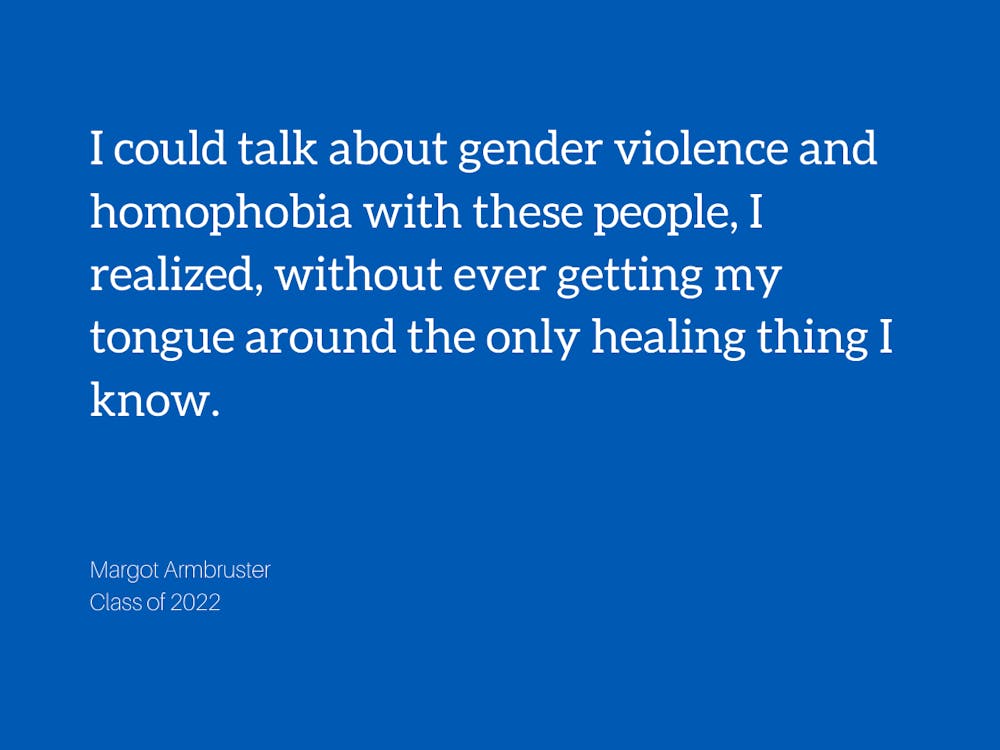Lately I am always coming out.
This past summer, swimming in wildflowers and theory at Oxford, I looked up from my books to realize I was in love with a close female friend. Since then, I’ve been gradually telling those close to me that I’m attracted to more genders than I once thought. It’s been painstaking, and not everyone knows yet (hi, Mom and Dad!), but these conversations ultimately feel liberating.
Talking about faith at Duke feels much the same.
I wasn’t always religious. My childhood was etched with a loose Christianity, but I had no first communion or confirmation, no theological initiation besides Vacation Bible School one summer when I was five. I came to Duke wanting vaguely to deepen my faith life and knowing not at all how to do so—and then, as will sometimes happen, I joined a Christian a cappella group. Last year around this time, I found myself sitting in the pews at the Episcopal Center, a little house on Alexander Avenue which I think has saved my life.
Faith is intensely personal, and experience resists easy narrative’s embrace. I could tell you about the night I spent floating in an outdoor pool, searching the stars for answers, when something behind the sky clicked and I saw the Big Dipper clearly for the first time. Or I could tell you about the Jazz Vespers where I divulged how knotted and deep my climate anxiety had become and the minister just held my hands as I cried, because l was finally known and love could still bind me back up. I could tell you, simply, about dawn glazing the mountains with blue-gold light.
It’s about community—about my dear friends, who unswervingly hold my gaze as we share Christ’s real presence in the Eucharist—and the deepest self, our most vivid anguish (“bright sorrow”) made holy.
I fumble for words. On Common Ground last semester, I tried on new labels for my sexuality, felt comfortable being out for the first time. We talked race and class, gender and its expressions, and it got gritty, fast. I grasped trauma I didn’t know still throbbed; I held space for others to do the same. After an almost impossibly difficult large-group conversation, a Wellness Center liaison led a walking meditation, but it frothed my nerves rather than centering me—I retreated, in the end, to read a Psalm. When we reconvened, I was almost embarrassed to explain where I’d been. I could talk about gender violence and homophobia with these people, I realized, without ever getting my tongue around the only healing thing I know.
It’s the same on campus, where most assume a blanket agnosticism. One friend and I recently had our first conversation about faith after she found my Book of Common Prayer; I’ve known her since O-week. My classmates in queer and gender studies courses refer happily to lived experience, but when my other seminars read St. Augustine or Jesuit poet Gerard Manley Hopkins, even peers I know to be religious hold the apologetics at arm’s length, never granting them personal stakes. Outside of class, “she’s religious” is always an insult—I can’t count the times I’ve shifted in my seat as acquaintances mocked people of faith as gullible, ignorant, naive.
I have to note that all faith is not the same, nor all queerness. Duke takes “Eruditio et Religio” for its motto, centers West Campus around a Methodist church (the Chapel once planned to broadcast the Muslim call to prayer but caved to Islamophobic backlash) and houses a Christian Divinity School wracked with debate over queer belonging. The Catholic Center remains the best-funded student organization on campus. As a Christian, then, I get visibility and safety not afforded to Muslims or Buddhists or Sikhs. Unlike many, I’ve also never felt at risk because of my sexuality. Though I haven’t really been out, my friends, chosen communities and family (hi, Mom and Dad, hope you’re still reading!) are unequivocally LGBTQIA+-affirming. Most days I feel both safety and belonging.
Still, there are questions I need to ask, and ways I need to be seen. When I mention my summer internship with the Institute for Christian Socialism, friends struggle to accept this ideological union, though it’s totally natural—the Gospel hates hoarded wealth and teaches a truly revolutionary devotion to social equality. I’m recently thinking about how to push mainstream Christianity past anthropocentrism and ineffectual “creation care” into real climate action, a project shared by Bill McKibben and just about nobody else. And I want to talk about the beauty and power of the queer theology I’m reading, especially with LGBTQIA+ friends who feel alienated from any spiritual life by fundamentalists. But when we tiptoe around faith, these conversations become impossible.
I’m not trying to convince anyone to convert to Christianity, or any religion, especially if a church has harmed you. (I think, actually, that in light of the colonialism and violence its institutionalized forms have enabled, I should be asked to answer for why I am still Christian.) But on this campus whose ethos is effortless perfection and cutesy, consumerist “self-care,” which seethes with anxiety and careerist neoliberalism, I crave the stillness faith life offers.
And I think some of you may crave it too. Mentioning to friends the weekend retreats I take to escape Duke’s noise, I’ve sensed palpable longing. I know many who are trying to deepen their mindfulness or meditate but who lack the community they need to be successful. We all deserve space to know ourselves and people to support us as we do.
I stumbled toward God by utter chance—by grace—and laying eyes on Their face has transformed me. When I walk toward God, I walk away from the self which craves objects and attention and thinness and control to step, if ever so ephemerally, into the light of justice. I want this Love for all of you, however it manifests, but more than anything I want us to be able to talk about it.
Recently, I signed up for an interfaith lunch series and was paired with Leah Abrams, who already sees too much of me. As a freshman, I thought about applying for the Chapel’s interfaith LLC but missed the deadline. There’s no easy cure-all, or none I’ve found, to our reticence, but I think all the parts of our lives should speak to each other. So that starts with me.
I don’t want to atomize myself anymore: here I am.
The Duke Queer and Trans Christians support space meets monthly in the Wellness Center.
Margot Armbruster is a Trinity sophomore who would love to come to your church or invite you to Lent at the (affirming) Episcopal Center. Her column runs on alternate Thursdays.
Get The Chronicle straight to your inbox
Sign up for our weekly newsletter. Cancel at any time.

Margot Armbruster is a Trinity senior and opinion editor of The Chronicle's 117th volume.

